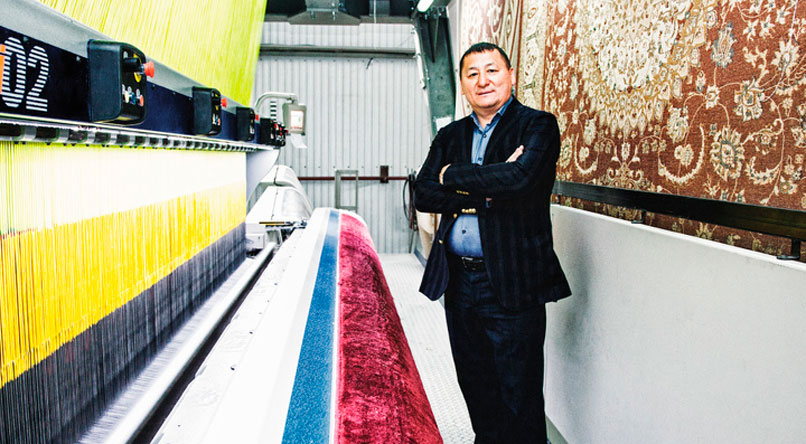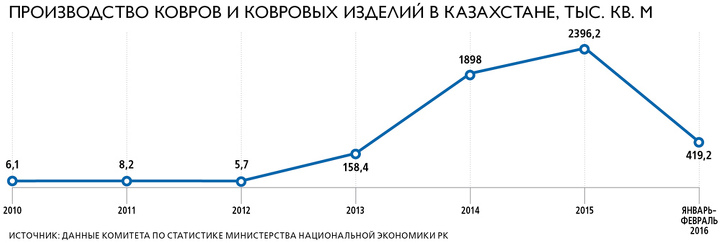HOW “BAL TEXTILE” BECAME THE FIRST KAZAKHSTANI SUPPLIER OF IKEA
Whitish capsules smaller than a pea. This is how recycled natural gas looks like – polypropylene, from which carpets are produced at the “Bal Textile” factory in Shymkent.
“In the world, 95% of carpets are synthetic, because they look better, more practical and cheaper than natural ones. This is important, as people have begun to change the interior more often,” says the director of the enterprise Talgat Iskhakhov, who has been engaged in the wholesale of carpets since 1994.
The thread spun
The idea to open his own production occurred to the merchant in the early 2000s, but then it was beyond his power. In 2011, Iskhakhov approached the idea from a different angle: together with the Turkish company “Kartal Khali Textile Sanayi ve Tidzharet Anonymous Shirketi”, he registered LLP on the territory of the Ontustik FEZ in South Kazakhstan. According to him, a partner from Turkey, who understands all the intricacies of carpet weaving, needed to increase sales markets. The Kazakhstani co-founders know how to sell carpets, they know the Central Asian and Russian markets. Therefore, joint efforts should have yielded and are already bearing fruit.
There is one more important player, without whose help “Bal Textile” could not have taken place. “The state has created a special economic zone in South Kazakhstan region to develop, among other things, carpet production. A road, gas, sewerage, water supply was connected to the enterprises on the territory of the SEZ, we just have to stretch 500 meters of electric cable from the substation. We don’t pay corporate, land and property taxes, raw materials that we import are not subject to customs duties. Land – 6 hectares – we were given a free lease for 10 years, then it will be necessary to redeem it at the cadastral value. In addition, there is a cheaper labor force and a mild climate in Shymkent” the businessman lists the advantages of working in the Ontustik SEZ.
The founders of “Bal Textile” (Iskhakhov and his brother own 50% of the enterprise, the other 50% – “Kartal Khali Textile”) invested 1.2 billion tenge of their own funds in the construction of the factory. At the first stage, the company erected covered premises with a total area of 15 thousand square meters- two workshops and an administrative building, and also bought four looms.
To implement the second stage, we took a loan in the amount of 2.2 billion tenge through the Damu Fund for six years at 6% per annum – for working capital and the purchase of three more machines and a complex for the production of polypropylene yarn from the German Oerlikon Neumag worth 1.8 million euro. For Kazakhstan, this is a unique production: no one else in the republic produces threads for carpets. The complex’s capacity is 10 tons per day. This made it possible to reduce the cost of production by 20%.
“We want to develop further. At the third stage, we plan to purchase an additional 15 machines and two extruders to produce up to 50 tons of threads per day. We don’t know when the third stage will be completed yet: everything will depend on the market situation,”– says Iskhakhov.
The payback period of the project is five years, the total investment in three stages is 8.5 billion tenge.
Presidential aid
In fact, production at “Bal Textile” began in September 2013. “It was hard for us,” the General Director admits, “because people did not believe that they could produce high-quality goods in Kazakhstan and did not want to buy our carpets.” The businessman’s words are confirmed by the analysis of consumer behavior prepared by DAMU Research Group in 2012: 61% of the respondents preferred Turkish-made carpets and only 11% – domestic.
Local manufacturers see Uzbekistan as their main competitor. “Their labor force is cheaper and there is serious state support: carpet production is subsidized, when carpets are imported into the country, they are charged customs duties in the amount of 60-70% of the value of the goods. Uzbekistan, on the other hand, sells its products abroad even below the cost price – in order to ensure the inflow of foreign currency into the country” explains Jomart Kerimsheev, executive director of Bal Tekstil.
Perhaps the import preferences of Kazakhstanis are associated not only with a skeptical attitude towards “made in Kazakhstan” goods, but also with the fact that the republic simply does not produce enough carpet products. According to the National Agency for Export and Investment Kaznex Invest, by the end of 2015 consumption amounted to about 12.3 million square meters. m of carpets and carpet products (in 2014 – 12.4 million sq. m.) and only 20% of needs (2.4 million sq. m.) are covered by domestic enterprises (in 2014 – 15%).
The situation with sales of “Bal Textile” in 2014 was changed by a visit to the factory by the President of Kazakhstan. “The head of state said that it is necessary to support domestic producers. The visit was shown on many TV channels, covered in newspapers. It became a very good advertisement for us,” the source admits. The company also played into the hands of the victory in the same year at the regional stage of the competition “The best product of Kazakhstan” and the second place in the republican competition “Altyn Sapa”.
The effectiveness of PR is demonstrated by the figures: in the IV quarter of 2013, the factory produced 154 thousand sq. m of carpets (turnover amounted to 222 million tenge), in 2014 – 1 million 818 thousand square meters (1.775 billion tenge), in 2015 – 2 million 180 thousand sq. m (2.125 billion tenge).
The company is in no hurry to make forecasts for 2016, stating that if last year the capacity of a factory capable of producing 5 million sq. m per year, were loaded by 90%, then this is only 70%. The reason lies on the surface – a decrease in effective demand due to the devaluation of the national currency. “One square meter of our production costs from $ 3 to $ 15. After the devaluation, tenge prices had to be raised almost twice, because we buy all the raw materials abroad,” explains Kerimsheev.


